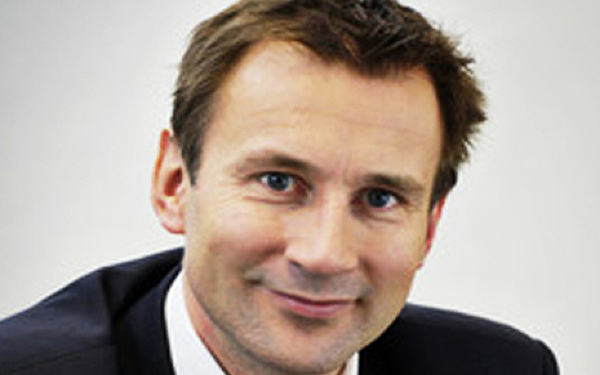
Councils will be able to deliver an extra 200,000 care packages over the next two years through what chancellor Jeremy Hunt described as the “biggest increase in funding” adult social care sector had received in its history.
As widely trailed, Hunt used his autumn statement today to announce a two-year delay to the adult social care charging reforms, including the £86,000 cap on care costs, which are now due to come into force in October 2025, beyond the next election.
However, instead of retaining the funding allocated for the reforms in the Treasury, Hunt said it would still go to councils, with £1.3bn available in 2023-24 and £1.9bn in 2024-25 to spend on adults’ and children’s social care.
He said a further £1bn in grant funding would be made available for adults’ services in 2023-24 and £1.7bn in 2024-25. Most of this will come via the Better Care Fund – the existing stream designed to support health and social care integration – to finance services to support hospital discharge, with the rest coming through a ring-fenced grant.
In addition, local authorities will be able to increase council tax by 3% over each of the next two years, up from 2%, without the need for approval through a referendum of local citizens. Authorities will also be able to increase the adult social care precept – a part of council tax reserved for the sector – by 2% each year, up from 1%. The Treasury is assuming that all councils will take advantage of these limits, raising £0.5bn in 2023-24 and £1.1bn in 2024-25, all of which it presumes will go to adult social care.
‘Biggest social care funding rise in history’
Hunt told the House of Commons: “This means an increase in funding available for the social care sector of up to £2.8bn next year and £4.7bn the year after. That’s a big increase. But how we look after our most vulnerable citizens is not just a practical issue, it speaks to our values as a society.
“So, today’s decision will allow the social care system to deliver an estimated 200,000 care packages over the next two years, the biggest increase in funding under any government of any colour in history.”
Hunt also announced expected significant rises in the national living wage and national minimum wage, which will benefit many care workers, though is broadly in line with the current rate of inflation. The former, for those aged 23 and over, will rise from £9.50 to £10.42 an hour, a hike of 9.7%, while the latter, for 21- and 22-year-olds, will go up by 10.9% to £10.18 an hour.
Part of the increase in adult social care funding will be needed to fund the implications for care providers of these increases.
There was worse news from 2025 onwards, for which Hunt pencilled in increases in government spending of 1% a year in real terms, a much lower rate than has been the case since 2020. However, this will be implemented after the next election, and it is unclear what it means for local authorities and social care.
Lukewarm sector reaction
The findings drew a lukewarm reception from social care leaders, many of whom had feared a much worse outcome than Hunt delivered.
The County Councils Network, which has long called for a delay to the charging reforms, said this was “a brave decision but completely the right one”.
CCN chair Tim Oliver said: “We understand that many will be disappointed but postponing these reforms and reinvesting significant additional funding into frontline care services is strongly welcomed and will protect the most vulnerable in our society as well as buy councils vital time to stabilise the care system.
“This will go a long way to enable us to address existing pressures, commission more care packages, and ensure that the reforms are a success on day one of their introduction in 2025. The government must ensure that as much of this additional funding as possible is distributed directly to councils, who will work tirelessly with their health partners to speed up hospital discharge.”
Pressures ‘could become unsustainable’
However, he warned that some local leaders may be reluctant to raise council tax by 5% during a cost-of-living crisis, and a reduction in spending growth beyond 2025 could be “extremely difficult” for services under “immense pressure”.
Oliver added: “Unless government addresses inflation next year, and the economy picks up before 2025, councils’ funding shortfall will grow year-on-year and become unsustainable.”
For the Association of Directors of Adult Social Services, president Sarah McClinton and chief executive Cathie Williams said: “We still need to read the small print, but with tens of thousands waiting for care and support, unpaid carers breaking down and staff quitting in droves, today’s announcement appears to provide some welcome relief and lessen some of the impact of the current crises ahead of what promises to be the most difficult winter any of us can remember.
“The next step is to develop a long-term, fully funded plan that provides the right support for older and disabled people, and unpaid carers, together with an adult social care workforce plan that complements the one announced for the NHS.”
Homecare Association chief executive Jane Townson said the additional funding offered relief from severe pressures on the domiciliary care sector, which had contributed to 30,000 people waiting for care packages and 13,000 people being stuck in hospital despite being ready to leave.
“The chancellor has recognised the fact that homecare simply cannot meet the demand, and we welcome the substantial investment,” she said.
In the context of the rise in the national living wage, which she said would “further increase the cost of delivery”, Townson said the additional funding “must be directed to improving pay and terms of conditions of employment so we can grow and develop the workforce to meet demand”.
As of March 2022, home care had a vacancy rate of 13%, above the sector-wide average of 10.7%, both figures having grown over the previous year.
‘Disappointing’ delay to care cap
In its response, think-tank the King’s Fund gave a qualified welcome to the adult social care funding boost but criticised the delay to the funding reforms, on the grounds that deferring the cap would leave many people continuing to face unpredictable care costs.
Chief executive Richard Murray said: “The significant additional funding announcement for social care indicates the government’s recognition of the perilous state of the sector. However, increases to the national living wage, hikes in energy prices and ongoing inflationary pressures will all add to social care providers costs. It also remains unclear how much of the additional funding may have to come from council tax rises and where today’s proposals leave local authority finances overall.
“What we do know is that part of this extra funding is coming from further delay to the much-needed reforms on how we pay for adult social care. This is disappointing and the delay to the extension to the means test and a new capped cost model will leave many thousands of families missing out on this promised new support.”
Health leaders gave a similar message, with NHS Providers interim chief executive Saffron Cordery saying that, while the extra cash for social care was welcome, the delay to the reforms was a “backwards step”, which would “continue to leave many people facing unpredictable care costs”.
She added: “Trust leaders are seeing daily how years of under-investment in social care has knock on effects for the NHS with thousands of people staying in hospital longer than needed. We need radical action – and fast.”



 A trauma-informed approach to social work: practice tips
A trauma-informed approach to social work: practice tips  Problem gambling: how to recognise the warning signs
Problem gambling: how to recognise the warning signs 




 Find out how to develop your emotional resilience with our free downloadable guide
Find out how to develop your emotional resilience with our free downloadable guide  Develop your social work career with Community Care’s Careers and Training Guide
Develop your social work career with Community Care’s Careers and Training Guide  ‘Dear Sajid Javid: please end the inappropriate detention of autistic people and those with learning disabilities’
‘Dear Sajid Javid: please end the inappropriate detention of autistic people and those with learning disabilities’ Ofsted calls for power to scrutinise children’s home groups
Ofsted calls for power to scrutinise children’s home groups Seven in eight commissioners paying below ‘minimum rate for home care’
Seven in eight commissioners paying below ‘minimum rate for home care’
 Facebook
Facebook X
X LinkedIn
LinkedIn Instagram
Instagram
Finally…. Let’s just hope it’s not too late… a long term plan of investment is actually what is needed, which would allow for less spending on short term and short sight solutions.
i thought Jeremy Hunt was going to protect the most vulnerable. We have some savings so are self funding my Alzheimer husband’s care. He is 77 and I am 74.
We took the care fees cap starting in October as fact,
if you read http://www.gov.uk website it categorically says ” from October 2023 the cap will be set at £86,000. This means the maximum amount anyone will have to pay for personal care to met their eligible care and support needs from October 2023 will be £86,000. ”
Delaying the cap for 2 years will cost us approximately £60,000 a year care home fees, paying £120,000 extra as well as the £86,000 cap. As our home is jointly owned it will need to be sold sooner or later to pay care fees.
Tax changes and increased mortgages are unlikely to cost anyone £60,000 a year extra so why are we being singled out to pay the highest costs of the recent budget? We are already very vulnerable pensioners of modest means who worked hard to provide a home for ourselves.
The government website said the cap would start in October 2023 and government should do what it said it would. It would not have to start paying out immediately as the £86,000 cap would take some time to be reached.
Please Mr Hunt, reconsider, protect the vulnerable, don’t penalise them, do the decent thing and have the care fees cap start in October 2023